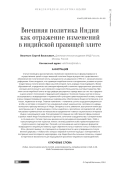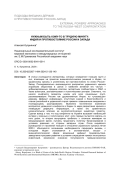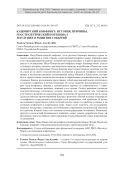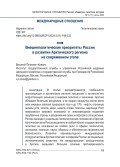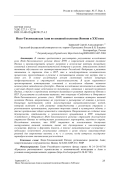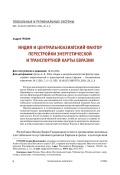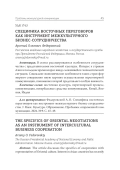Статья посвящена рассмотрению изменений, привнесенных в формулирование и осуществление целей и задач внешней политики Индии в результате существенного обновления ее политической элиты, запущенного начавшимися в 1990-е гг. экономическими реформами. Констатируется, что правящая индийская элита в сегодняшних условиях в целом тождественна политической, образ мыслей которой, пусть изрядно помолодевшей и более образованной, определяется ее самоидентификацией в понятиях традиционных ценностей, носящих религиозный и, для огромного индусского большинства, кастовый характер. При этом состав индийской элиты в годы реформ расширился, прежде всего за счет каст среднего и даже низкого положения в традиционной иерархии. Усиление страны многие склонны ассоциировать с возвращением к «правильной» культурно-цивилизационной основе, которая в века, предшествовавшие чужеземным завоеваниям, обеспечивала Индии естественное, в их глазах, первенство в мире. Главное изменение - появление у элиты ощущения уверенности в себе, на которое и опирается так называемый новый национализм «человека из народа» нынешнего премьер-министра Н. Моди. Опираясь на его заявления, выступления министра иностранных дел С. Джайшанкара и статьи индийских и российских исследователей, автор показывает привнесенные им новшества в продвижении главных национальных интересов Индии в меняющемся мире. Рассматриваются создание ею собственной сферы влияния в рамках новой Индо-Тихоокеанской стратегии; сочетание сотрудничества и соперничества в отношениях с Китаем; причины динамичного расширения взаимодействия с США и присутствующие в нем «красные линии»; мотивы развития особо привилегированного стратегического партнерства с Россией и использования многосторонних форматов; возвращение в индийскую повестку задач обретения статуса главного голоса «глобального Юга». Делается вывод, что строящиеся на приоритетности цели утверждения в статусе великой державы и глобального актора в мировой политике подходы к императивности построения многополярного миропорядка, «где Индия была бы сильным полюсом», создают исторические возможности для наращивания российско-индийского взаимодействия.
